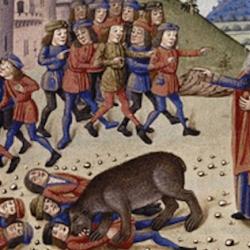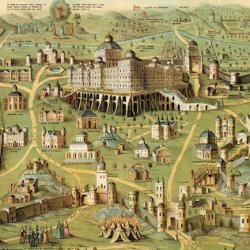1) There are repeated verbal links between the opening of 1 Kings 17 and the opening of chapter 18. The word of Yahweh comes to Elijah, telling him to ?go?E(17:2; 18:1). In both chapters, the word ?cut off?Eis used (the brook ?Cherith?E Jezebel?s ?cutting off?Eof prophets; the ?cutting off?Eof cattle). In both cases, there is a reference to ?years?E(17:1; 18:1). In both cases, Yahweh provides (the same verb in both places, in the same aspect) bread and water for a prophet/s (17:6; 18:4). In both, there is a reference to ?wadis?E(17:3; 18:5).
2) There is also the more layered parallel between Ahab and Yahweh. Yahweh tells Elijah to ?go?Eat the beginning of both chapters; Ahab tells Obadiah to ?go?Ein chapter 18. Both Ahab and Yahweh tell their servants to ?go?Eto a wadi. This sets up the contest of chapter 18 not only as a contest of Baal and Yahweh, but a contest of Yahweh as the king of Israel and Ahab as the false king. Obadiah is set in the middle between the two. Ahab ?calls?Ehim to search for water, and Elijah, bearer of Yahweh?s word, ?calls?Ehim to announce him to Ahab. Which king will Obadiah listen to? He is a picture of Israel, forced to choose Yahweh or Ahab, Yahweh or Baal. He is trying to serve two masters (cf. the switching of pronouns attached to ?master?Ein vv. 7, 9, 10, 12, 13).
3) Obadiah has a right to be surprised at Elijah?s sudden appearance. After all, the prophet has been out of the country for three years, presumed dead by many no doubt. Elijah answers Obadiah?s astonished question, ?Is that you??Ewith a single word, the first person singular pronoun: ?I.?EUsed in these contexts, the word sometimes implies ?I am?E(Gen 27:24), and suggests a remarkable identification between Elijah and Yahweh. Elijah?s appearance is indeed the return of Yahweh to the land.
4) The word for ?limp?Ein 18:21 is used only a handful of times in the Hebrew Bible. Most dramatically, it is used in Exodus 12:13, 23, 27 to describe the angel of death ?skipping?Eor ?limping past?Ethe houses that have blood sprinkled on the doorposts. In fact, the Hebrew word for Passover is the noun form of this verb, Pesach, from which the word ?pascha?Eis derived. Though the word is not used in Genesis 32, there appears to be a link between the limping of the man Israel and the ?limping?Eredemption that the nation Israel. Elijah employs the word here no doubt as a reminder of Israel?s constituting event, the night when Yahweh ?limped over?EIsrael in Egypt. The word is used again in 1 Kings 18:26 to describe the procession of the Baal prophets around their altar. They are a false Israel, not the sons of the limping Jacob. The fact that Elijah refers to Israel as ?sons of Jacob?Ein 18:31, and quotes from Genesis 32:28 confirms the connection.
5) The word translated ?opinions?Ein the NASB is in fact a word for ?tree branch?E(Is 17:6; 27:10; related word in Ezek 31:6, 8). (The verb form of the word is used only in Psalm 119:113, translated as ?double-minded?Ein the NASB. A more vivid translation would be ?branched,?Eyielding ?I hate those who are branched/ but I love thy law.?EThe meaning is perhaps the same, but the use of ?branch?Epicks up on the imagery of men and trees that runs through the Psalms and the Scriptures.) In 1 Kings 18, the word appears to mean ?crutch,?Ethat is, a branch a lame person uses to walk. The image is of a cripple limping along with two crutches, apparently of unequal length and strength. Elijah?s challenge is that Israel should not continue to use both Yahweh and Baal as ?crutches?Eto enable them to limp along. Rather, they should choose, and ?walk?Eafter one or the other. Trying to serve to master?s produces a limping, halting gait, and makes it impossible to walk straight. Further, there is a pun on ?limp?Eand ?branch/crutches?E Limp is pasach, while branch is se?ip ?Ethat is, the two words share two consonants.
6) ?Trench?Ein verse 32 is te?alah which contains ?alah, ?to go up?Eor ?ascend,?Ethe root of the word for ?ascension offering.?EThe same word is used in 2 Kings 18:17 (for a water conduit) and in Ezekiel 31:4 (for a channel). But the word suggests something ?high?Erather than something ?low.?EInterestingly, another word with the same consonants is used for healing of a wound in Jeremiah 30:13; 46:11. The description of the size of the trench is unusual. The Hebrew says ?according to the house of seahs of seed.?EThis appears to mean what the translations say; the trench was large enough to hold 2 seahs of grain. But why describe the trench in terms of the seed it will hold, and why use the word ?house?Ein this context? These terms suggest a reference to the ?house?Eof Israel that is going to be renewed and become fruitful again.
7) Elijah is acting as a priest: constructing the altar, then arranging wood, cutting the animal, and laying the pieces of the wood on the animal. This is different, however, from the tabernacle instructions, which always talk about laying various things ?on the fire.?EHere there is not yet any fire (cf. Leviticus 9). It is also noteworthy that Elijah is ?building?E(as have Solomon and Ahab in Kings), with a ?stone?Efoundation/altar, with wood overlaid, and an animal on the wood. The construction suggests an analogy with the temple, and also with the people of Israel, since the temple is the nation architecturally embodied.
8) In 1 Kings 18:36, Elijah prays to the God of Abraham, Issac, and Israel. This is unusual usage, found only here, in several passages of Chronicles (1 Chronicles 29:18; 2 Chronicles 30:6), and, most importantly, in Exodus 32:13, where Moses pleads with Yahweh to ?Remember Abraham, Isaac, and Israel, Your servants to whom You swore by Yourself, and said to them, ‘I will multiply your descendants as the stars of the heavens, and all this land of which I have spoken I will give to your descendants, and they shall inherit it forever.?? This occurs after Israel has committed its first act of idolatry with the golden calves. Elijah?s situation is very similar: Israel has not grown up from golden calves to Baal worship, and Elijah is playing Moses, pleading with God to show Himself to be Israel?s God. As at Sinai, so at Carmel: Those who worship false gods ?Egolden calves or Baals ?Eare slaughtered, and the people shout their commitment to do all that Yahweh requires. This reinforces the notion that Elijah is leading a covenant-renewal event. The covenant was broken at Sinai when Israel worshiped golden calves (broken tablets), yet because of the intervention of a prophet Yahweh relented from His wrath, showed His glory to Moses, and renewed the covenant. So at Carmel: Yahweh is renewing covenant in response to the pleading of a prophet, who pleads, as Moses did, in the name of ?Abraham, Isaac, and Israel.?EIn Exodus 32:13, the promise that Moses alludes to is a promise of numerous descendants, and that is hinted at in the ?house of seed?Eimage in 1 Kings 18:32.
9) Elijah not only wants everyone to know Yahweh is God, but that Elijah is His prophet. He seeks vindication for himself, that he is doing all he does according to the word of Yahweh, as well as vindication for Yahweh. There is a Pauline dimension to this: The righteousness of God is revealed in the vindication of those who trust in Jesus.
10)When fire falls from heaven, the people fear, as Obadiah had feared Yahweh since his youth. When fire falls, they fall on their faces, as Obadiah had fallen on his face in the presence of Elijah. Obadiah represents Israel, double-mastered, but finally fearing Yahweh and honoring His prophet.
11) The first reference to “girding loins” (that I can find) is in Exodus 12:11. Israel was to gird their loins for a hasty exit from Egypt. So also in 1 Kings 18: The Lord’s judgment has fallen on a substitute, the temple-altar of Elijah on Carmel; and Ahab has eaten and drunk a “Passover” meal. Now, Elijah girds up his loins to hastily return to Jezreel. He is leading the royal entourage on a new exodus out of idolatry, havin
g led the people in renewing the covenant.















